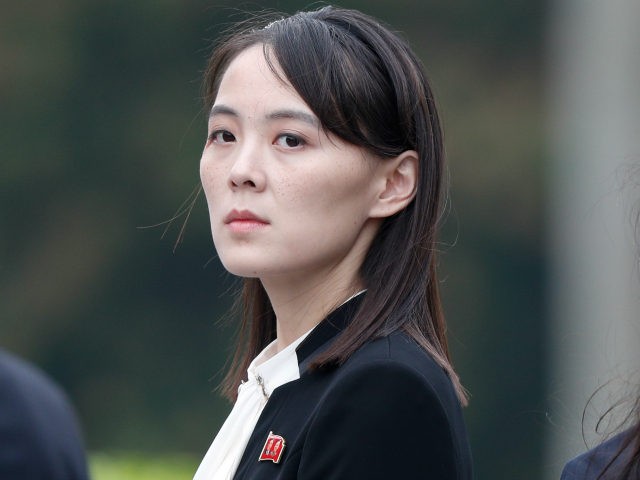Kim Yo-jong, the powerful younger sister of North Korean dictator Kim Jong-un, warned President Joe Biden in a statement published Tuesday that “greater disappointment” lay ahead for Washington if it sought dialogue with Pyongyang.
The younger Kim stated in her remarks, published by the state-run Korean Central News Agency (KCNA), that she was responding to a comment made by Biden’s National Security Advisor Jake Sullivan that Kim Jong-un had sent an “interesting signal” to the Biden administration by mentioning dialogue in remarks last week. Kim Jong-un, speaking at a plenary meeting of his Workers’ Party of Korea (WPK), had said that Pyongyang should be ready for both “dialogue and confrontation” with America, just days after admitting that the country was running out of food and the general quality of life in the country was getting “worse.”
President Biden has not yet implemented a coherent policy on North Korea since taking office in January. Multiple reports in the winter suggested that Biden had ordered diplomats to attempt to reach out to Kim, leading Pyongyang to confirm that North Korean officials were simply ignoring the new administration. Biden later announced an overhaul of North Korea policy but has yet to debut any significant reforms from the policies of predecessor Donald Trump.
Experts consider Kim Yo-jong one of North Korea’s most powerful people and a potential successor to her brother. Under the current communist regime, founded by the Kims’ grandfather Kim Il-sung, a Kim has ruled the country for over 70 years. Kim Jong-un demoted Kim Yo-jong out of the nation’s powerful Politburo early this year, initially suggesting she had lost power, but she has remained a consistent presence in Pyongyang’s communication with the United States.
“I heard the news that the U.S. National Security Advisor had mentioned that he regards the position towards the U.S. as an ‘interesting signal,'” Kim Yo-jong wrote in her Tuesday statement. “A Korean proverb says that ‘In a dream, what counts most is to read it, not to have it.'”
“It seems that the U.S. may interpret the situation in such a way as to seek a comfort for itself. The expectation, which they chose to harbour the wrong way, would plunge them into a greater disappointment,” the short message concluded.
Kim’s remarks appeared to be a reply to National Security Advisor Sullivan’s remarks on ABC News’ This Week on Sunday in which he reiterated that Biden was “prepared to engage in principled negotiations with North Korea” regarding its illegal nuclear weapons program.
“We are awaiting a clear signal from Pyongyang as to whether they are prepared to sit down at the table to begin working in that direction. His [Kim Jong-un’s] comments this week we regard as an interesting signal,” Sullivan said. “And we will wait to see whether they are followed up with any kind of more direct communication to us about a potential path forward.”
Kim Yo-jong addressed Biden most recently in a statement in March, urging him to not “cause a stink” if he “wants to sleep in peace for coming [sic] for years,” without specifying what Biden had said to trigger the warning.
Part of Biden’s attempt to overhaul North Korean policy has been to send Special Representative for North Korea Sung Kim to Seoul last week. Sung met with leftist South Korean President Moon Jae-in on Tuesday and, similar to Sullivan, emphasized Biden’s desire to rekindle dialogue with the repressive communist regime. Kim reportedly told Moon that he would do the “utmost to resume dialogue between North Korea and the United States.”
“I agree that this is an important moment for both the Republic of Korea and the United States, and I hope that the DPRK will respond positively to our proposal for a dialogue,” Sung Kim was quoted in South Korea’s JoongAng Ilbo as stating. The meeting did not appear to yield a concrete roadmap for how to achieve dialogue, however, or specifics on what the goals of the dialogue should be.
Kim Yo-jong’s remarks follow her noted absence in the WPK plenary meeting sessions last week, chaired by her brother. Kim Jong-un dedicated most of the meetings’ energy towards a functional agricultural policy after devastating floods ravaged the nation’s food supply last year, already under pressure from North Korea’s alleged decision to shut down trade on its border with China. North Korean officials have repeatedly insisted on an aggressive campaign to prevent Chinese coronavirus infections even as they assert the country has not documented a single case of the disease, a claim most international experts consider highly unlikely.
Kim Jong-un addressed policy towards the United States on Thursday.
“The General Secretary [Kim Jong-un] stressed the need to get prepared for both dialogue and confrontation,” according to KCNA, “especially to get more fully prepared for confrontation in order to protect the dignity of our state and its interests for independent development and to reliably guarantee the peaceful environment and the security of our state.”
KCNA noted that Kim “made detailed analysis of the policy tendency of the new U.S. administration toward our Republic” but offered no details that would help the outside world understand how Kim interprets the Biden administration’s policies. Most of KCNA’s analysis focused instead on Kim Jong-un again emphasizing the importance of having a vibrant agriculture sector and feeding the nation’s children amid what he hinted was a growing crisis.
Earlier in the week, Kim Jong-un admitted that the “people’s food situation is now getting tense” and commanded his underlings to “take a positive measure for settling the problem” of agricultural failure.
“The subjective and objective conditions and environment for the revolutionary struggle have become worse upon entering this year but the country’s economy has shown improvement as a whole,” Kim claimed.

COMMENTS
Please let us know if you're having issues with commenting.